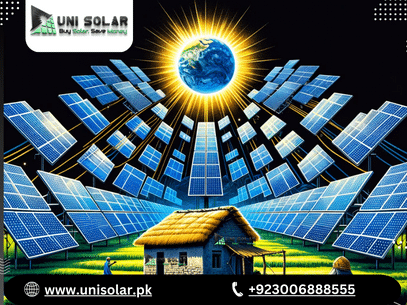Best OFF Grid Solar System for Homes in Pakistan
First Off
The transition to sustainable living has attracted a lot of attention in recent years. Off grid solar systems are one of the most potent, environmentally friendly choices available for meeting household energy needs. This thorough guide explores the fundamentals of off-grid solar systems for houses and provides insightful information for anybody thinking about making this environmentally responsible switch.
Having a Basic Understanding of Off Grid Solar System
A solar power system that operates independently of the local electricity grid is known as an off grid system. A battery bank, an inverter, a charge controller, and solar panels are usually included. This system captures solar energy, converts it into electricity, and stores it for later use.
Elements and Capabilities
The main elements that collect sunlight and transform it into direct current (DC) electricity are solar panels.
Charge Controller: It maintains ideal charging and guards against overcharging by controlling the voltage and current going from the solar panels to the battery.
Battery Bank: Especially at night or on overcast days, batteries store the electricity produced for later use.
Inverter: An inverter is a device that transforms direct current (DC) electricity from solar panels or batteries into alternating current (AC), the type of electricity used in homes.
Off Grid Solar Systems’ Advantages
Impact on the Environment
Off-grid solar power systems cut greenhouse gas emissions by reducing dependency on fossil fuels. They contribute to the fight against climate change as a clean, renewable energy source.
Energy Self-Sufficiency
When a home has an off-grid system, power outages and grid failures do not affect the homeowners. It offers a means of subsistence that is independent of the fluctuations inherent in traditional energy sources.
Economy of Cost
Off-grid solar systems can save a lot of money over time, despite the initial high setup costs. It’s a cost-effective choice because of lower electricity bills and low maintenance requirements.
Site Assessment and Installation Process
It is essential to have a professional evaluate your home’s location, solar potential, and energy requirements. Roof space, exposure to sunlight, and local temperature are some of the factors that greatly affect how efficient the system is.
Design of Systems
A system is created to satisfy your home’s unique energy needs based on the assessment. This entails choosing the appropriate quantity and size of batteries, solar panels, and other parts.
Skilled Installation
Securing the services of proficient experts guarantees a secure and effective installation. The longevity and functionality of the system depend on its proper configuration.
Reconstruction and upkeep
Continual Cleaning
For solar panels to remain efficient, cleaning is necessary on a regular basis. The sun’s obstruction by snow, debris, and dust can reduce the system’s output.
Battery Upkeep
Lead-acid batteries, in particular, require routine maintenance. To extend their lives, this involves making sure they are correctly charged and monitoring the fluid levels.
Monitoring System
Frequent performance monitoring of the system aids in the early detection of any problems. Monitoring software is included with many contemporary systems for simple tracking.
Money-Related Considerations
First Invested
The off-grid solar system’s price varies according to its size and parts. It is imperative to weigh the short-term costs against the long-term profits.
Rebates and incentives
Installing solar systems is eligible for tax credits, rebates, and incentives in many places. To save money up front, look into regional initiatives.
ROI (return on investment)
Off-grid solar systems are a smart investment because of the long-term savings on electricity bills and the growth in property value, even though the initial cost can be expensive.
Difficulties and Solutions
Depending on the weather
The weather has an impact on solar power generation. It is advised to have a backup generator and a battery bank large enough to lessen this.
Energy Administration
Using energy effectively is essential in an off-grid setting. Using LED lights and energy-efficient equipment can significantly reduce power consumption.
Technical Proficiency
It is necessary to comprehend the technical aspects of the system in order to troubleshoot and maintain it. Homeowners ought to get knowledgeable about the fundamentals or have access to expert assistance.
In summary
Investing in an off-grid solar system for your house is one way to live sustainably. It provides long-term cost savings, energy independence, and environmental advantages. It has a high upfront cost, but the benefits in terms of lower energy bills and a smaller carbon footprint are great. A well-planned, installed, and maintained off-grid solar system can provide your house with a dependable and profitable energy source.


1 Comment
Exploring Solar Panel Efficiency in Pakistan - Uni Solar
[…] Read also: Best OFF Grid Solar System for Homes in Pakistan […]